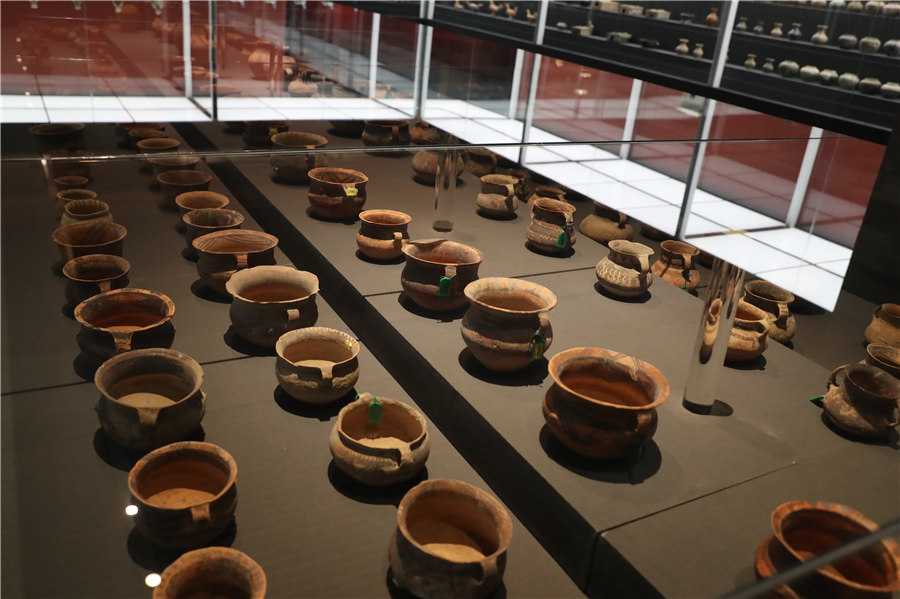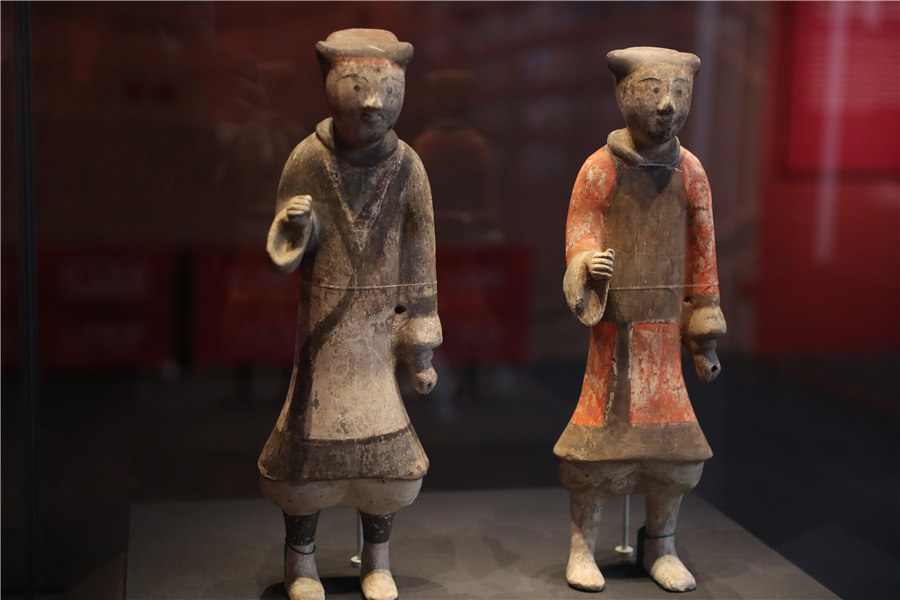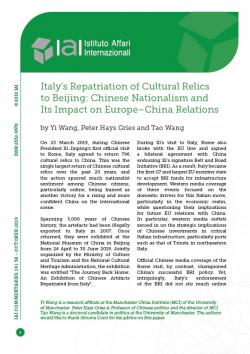Italy's Repatriation of Cultural Relics to Beijing: Chinese Nationalism and Its Impact on Europe-China Relations
Italy’s Repatriation of Cultural Relics to Beijing: Chinese Nationalism and Its Impact on Europe–China Relations
Yi Wang, Peter Hays Gries and Tao Wang*
On 23 March 2019, during Chinese President Xi Jinping’s first official visit to Rome, Italy agreed to return 796 cultural relics to China. This was the single largest return of Chinese cultural relics over the past 20 years, and the action spurred much nationalist sentiment among Chinese citizens, particularly online, being framed as another victory for a rising and more confident China on the international scene.
Spanning 5,000 years of Chinese history, the artefacts had been illegally exported to Italy in 2007. Once returned, they were exhibited at the National Museum of China in Beijing from 24 April to 30 June 2019. Jointly organized by the Ministry of Culture and Tourism and the National Cultural Heritage Administration, the exhibition was entitled “The Journey Back Home: An Exhibition of Chinese Artifacts Repatriated from Italy”.
During Xi’s visit to Italy, Rome also broke with the EU line and signed a bilateral agreement with China endorsing Xi’s signature Belt and Road Initiative (BRI). As a result, Italy became the first G7 and largest EU member state to accept BRI funds for infrastructure development. Western media coverage of these events focused on the domestic drivers for this Italian move, particularly in the economic realm, while questioning their implications for future EU relations with China. In particular, western media outlets zeroed in on the strategic implications of Chinese investments in critical Italian infrastructure, particularly ports such as that of Trieste in northeastern Italy.
Figures 1-2 | Repatriated cultural relics from Italy exhibited at the National Museum of China


Photo by Jiang Dong/China Daily.
Source: Wang Kaihao, “Artifacts on Display After Repatriation from Italy”, in China Daily, 25 April 2019, http://www.chinadaily.com.cn/a/201904/25/WS5cc0ee38a3104842260b8293.html.
Official Chinese media coverage of the Rome visit, by contrast, championed China’s successful BRI policy. Yet, intriguingly, Italy’s endorsement of the BRI did not stir much online discussion in China. Instead, Chinese “netizens” (Internet citizens) were overjoyed by the return of the Chinese cultural relics, discussing it at length. Hundreds of comments were peppered with phrases like, “welcome home”, “welcome back” and “thank you, Italy”. The returned relics clearly struck a sentimental chord, arousing intense nationalist sentiments among Chinese citizens. “In moments like this”, wrote one commentator on Weibo, China’s alternative to Twitter, “there are always tears in my eyes”.[1]
These deep emotional reactions are the product of a widespread victimization narrative about China’s “Century of Humiliation” (1839-1945) at the hands of the West and Japan. Many Mainland Chinese today are socialized to blame the West for the fall of the “Middle Kingdom” and for China’s gradual transformation from an unrivalled leader in the pre-modern era into a “half-colony” in early modern times.[2]
Central to the narrative of the “Century of Humiliation” is the traumatic 1860 British and French sacking of the Old Summer Palace (Yuanming Yuan) in Beijing. The Europeans burned buildings and looted precious antiques from the Imperial Gardens, an event that has become a symbol of Chinese victimization at the hands of Western imperialism.
Repatriating plundered cultural relics form the Old Summer Palace is one way to “erase” past memories of humiliation and foster renewed sentiments of national pride.[3] The cultural relics Italy recently returned to China did not originate from the Palace. Nonetheless, the very notion of repatriation is sufficient to arouse intense emotions, serving as a sort of antidote for a re-reading of the past.
“Don’t forget the national humiliation”,[4] one netizen noted in the wake of Italy’s return of the artefacts, repeating an official Chinese dictum routinely used in education and historical commemorations. A successful achievement is thus juxtaposed against the collective memories of a traumatic past, in such a way as to also contribute to the China Communist Party’s promise to “make China great again”.[5]
Yet, for many Chinese netizens, Rome did not return the relics out of “goodwill”. Instead, their return is the product of China’s growing relative power: as China rises, Western countries will be forced to repay their “historical debts” – to “kowtow”, or bow, to a rising China. “This is the influence of a great power”, one netizen wrote online. “It is only when we have power that they return our cultural relics”.[6] Another netizen put it similarly; “A strong diplomacy comes only after a country becomes powerful”.[7]
This realpolitik reveals the perils of Chinese nationalism today. The “Century of Humiliation” has been embraced as a lesson and a warning, and Chinese society tend to view world politics as a realm where only the strong survive and where “might equals right”. European powers are depicted as having lost their predominant influence in world affairs and therefore should be expected to bend to China’s will more often than before. When Italy signed onto the BRI and returned cultural relics to China, many Chinese nationalists did not see a need to reciprocate this Italian act of “goodwill”, instead considering this a natural evolution of world politics and changing power relations between China and Italy.
This Chinese view extends well beyond Italy. In April 2018, a British auction house sought to sell a Chinese bronze that had likely been looted from the Old Summer Palace in 1860. The Chinese State Administration of Cultural Heritage called for a boycott of the auction, and demanded that the British firm respect “the feelings” of the Chinese people.[8] Popular Chinese nationalists agreed. “China should make the rules”, a Chinese netizen wrote online, “and force these rogue robbers to abide by it!”[9] Cultural relics, repositories of feelings of past victimization, have thus become a symbol that can ignite both Chinese pride and indignation.
As Chinese public opinion becomes more self-confident and demanding, its influence over Chinese foreign policy may also increase. A widely shared belief among many Chinese nationalists today is that Europe and Japan, led by the US, are forming a coalition to contain China’s rise. Thus, the imperialist “robbers” are unrepentant and must therefore be forced to respect China’s national interests and recognize Beijing’s growing power. Moreover, strengthened state control (e.g. censorship) of the Internet privileges nationalistic voices while silencing more liberal and cosmopolitan views. This biased representation tends to promote a one-sided and hawkish picture of public opinion in China and the broader world, and is in turn able to legitimate an assertive Chinese foreign policy.
This nationalistic and realpolitik worldview, coupled with a sense of entitlement following past victimization, will not be easily overcome. Change it must, however, as such modalities of international relations and understandings of foreign policy contribute to further distrust and animosity between China and the West. Rather than constructing an unrealistically rosy image of Sino-Italian/European friendship, a preferable long-term modality of engagement with China should rest on efforts to better inform Chinese citizens and audiences of the fundamental changes of world politics. The imperialist “robbers” of the past have changed, not only economically, but also politically and diplomatically and so has the broader international system.
European states should on the one hand acknowledge and be truthful and reflexive about their past responsibilities in China as elsewhere, but on the other try to promote a better understanding of Europe’s progressive history. Telling stories of how European states have gradually overcome their conflictual past and formed a peaceful security community embracing the principles of transparency, multilateralism and accountability – rather than the realist balance of power – can contribute to countering zero-sum depictions of international relations and pushing back against the realpolitik principle that “might equals right”.
After all, it is within the open international system that China has risen to where it stands today. While the task will no doubt be challenging, it may well be the only way to deal with the pernicious consequences of how imperialism is remembered in China today, helping both sides to heal old wounds and build a better, more cooperative and balanced relationship in the future.
* Yi Wang is a research affiliate at the Manchester China Institute (MCI) of the University of Manchester. Peter Hays Gries is Professor of Chinese politics and the director of MCI. Tao Wang is a doctoral candidate in politics at the University of Manchester. The authors would like to thank Simone Corsi for his advice on this paper.
[1] Jellywu, Weibo post, 25 March 2019, https://www.weibo.com/1618051664/HmlWY8JDT?type=comment.
[2] Peter Hays Gries, China’s New Nationalism. Pride, Politics, and Diplomacy, Berkeley, University of California Press, 2004; Zheng Wang, Never Forget National Humiliation. Historical Memory in Chinese Politics and Foreign Relations, New York, Columbia University Press, 2012.
[3] There is also a long-going debate on whether China should rebuild the Old Summer Palace. In 2015, a Chinese enterprise spent around 30 billion yuan (4.8 billion dollars) to rebuild a new Yuanming Yuan (Yuanming xinyuan) in Hengdian, Zhejiang.
[4] Fei Zhuming Keyan Mingong, Weibo post, 25 March 2019, https://www.weibo.com/1618051664/HmlWY8JDT?type=comment.
[5] Jinghan Zeng, “Xi Jinping Sets Out Plans to Make China Great Again”, in The Conversation, 20 October 2017, http://theconversation.com/xi-jinping-sets-out-plans-to-make-china-great-again-86022.
[6] Menmen de Pipixia, Weibo post, 25 March 2019, https://www.weibo.com/1618051664/HmlWY8JDT?type=comment.
[7] Sike Gangjing Shengmu Pengzi Dengyiqie Wangluobaoli, Weibo post, 25 March 2019, https://www.weibo.com/1618051664/HmlWY8JDT?type=comment.
[8] Wang Kaihao, “China Calls for Boycott of UK Auction with Suspected Stolen Relic”, in China Daily, 10 April 2018, http://www.chinadaily.com.cn/a/201804/10/WS5acc7f4aa3105cdcf6517538.html.
[9] Song Caiping, “Ying paimaihang qiangxing paimai cong yuanming yuan jielue wenwu zhongguo guojia wenwuju qianze” (UK auction house force auction of cultural relics looted from Old Summer Palace; State Administration of Cultural Heritage condemn), in Cankao xiaoxi, 11 April 2018, http://www.cankaoxiaoxi.com/mil/20180411/2261289.shtml.
-
Dati bibliografici
Roma, IAI, ottobre 2019, 5 p. -
In:
-
Numero
19|58




